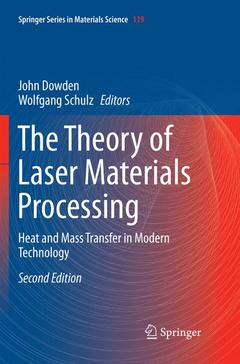The Theory of Laser Materials Processing (2nd Ed., Softcover reprint of the original 2nd ed. 2017) Heat and Mass Transfer in Modern Technology Springer Series in Materials Science Series, Vol. 119
Coordonnateurs : Dowden John, Schulz Wolfgang

The revised edition of this important reference volume presents an expanded overview of the analytical and numerical approaches employed when exploring and developing modern laser materials processing techniques. The book shows how general principles can be used to obtain insight into laser processes, whether derived from fundamental physical theory or from direct observation of experimental results. The book gives readers an understanding of the strengths and limitations of simple numerical and analytical models that can then be used as the starting-point for more elaborate models of specific practical, theoretical or commercial value.
Following an introduction to the mathematical formulation of some relevant classes of physical ideas, the core of the book consists of chapters addressing key applications in detail: cutting, keyhole welding, drilling, arc and hybrid laser-arc welding, hardening, cladding and forming. The second edition includes a new a chapter on glass cuttingwith lasers, as employed in the display industry.
A further addition is a chapter on meta-modelling, whose purpose is to construct fast, simple and reliable models based on appropriate sources of information. It then makes it easy to explore data visually and is a convenient interactive tool for scientists to improve the quality of their models and for developers when designing their processes. As in the first edition, the book ends with an updated introduction to comprehensive numerical simulation.
Although the book focuses on laser interactions with materials, many of the principles and methods explored can be applied to thermal modelling in a variety of different fields and at different power levels. It is aimed principally however at academic and industrial researchers and developers in the field of laser technology.
1 Mathematics in Laser Processing; John Dowden.- 2 Simulation of Laser Cutting; Wolfgang Schulz, Markus Nießen, Urs Eppelt and Kerstin Kowalick.- 3 Glass Cutting; Wolfgang Schulz.- 4 Keyhole Welding: the Solid and Liquid Phases ; Alexander Kaplan.- 5 Laser Keyhole Welding: The Vapour Phase; John Dowden.- 6 Basic Concepts of Laser Drilling; Wolfgang Schulz and Urs Eppelt.- 7 Arc Welding and Hybrid Laser-Arc Welding; Ian Richardson. - 8 Metallurgy and Imperfections of Welding and Hardening; Alexander Kaplan.- 9 Laser Cladding; Frank Brückner and Dietrich Lepski.- 10 Laser Forming; Thomas Pretorius.- 11 Femtosecond Laser Pulse Interactions with Metals; Bernd Hüttner.- 12 Meta-Modelling and Visualisation of Multi-Dimensional Data for Virtual Production Intelligence; Wolfgang Schulz.- 13 Comprehensive Numerical Simulation of Laser Materials Processing; Markus Gross.- Index.
Prof. John Dowden was educated at Bedford School and Cambridge University, UK, where he graduated with a First Class degree in Mathematics in 1962. He became the first student of the new University of Essex obtaining a PhD in Mathematical Oceanography in 1967. He was appointed to the staff of the Mathematics Department of the university and subsequently changed his main research interests to the mathematics and physics of laser technology while retaining interests in mathematically related applications of heat and mass transfer. Before retirement he was Head of the university’s Department of Mathematical Sciences, a member of the Institute of Physics and of the Laser Institute of America. He is still a Fellow of the Institute of Mathematics and its Applications and is now an Emeritus Professor of the University.
Prof. Dr. Wolfgang Schulz studied physics at Braunschweig University of Technology. He graduated from the Institute for Theoretical Physics and received a postgraduate scholarship in 1986 on the topic of "Hot electrons in metals". In 1987, he accepted an invitation to the department Laser Technology at RWTH Aachen University. He received the "Borchers Medal" award in 1992 in recognition of his PhD thesis. In 1997, he joined the Fraunhofer Institute for Laser Technology in Aachen and, in 1999, received the "Venia Legendi" in the field "Principles of Continuum Physics applied to Laser Technology". His postdoctoral lecture qualification (habilitation) was awarded with distinction in 1999 with the prize of the Friedrich-Wilhelm Foundation at RWTH Aachen University. Since March 2005, he has represented the newly founded department "Nonlinear Dynamics of Laser Processing" at RWTH Aachen University and is the head of the newly founded department of "Modelling and Simulation" at the Fraunhofer Institute for Laser Technology in Aachen. Since 2007, he is the coordinator of the Excellence Cluster Domain "Virtual Production" at RW
Date de parution : 08-2018
Ouvrage de 432 p.
15.5x23.5 cm
Date de parution : 07-2017
Ouvrage de 432 p.
15.5x23.5 cm



